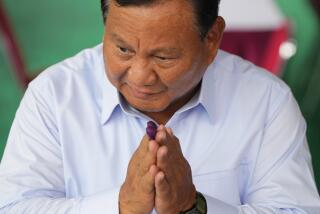Q
- Share via
JAKARTA, INDONESIA — Saud Usman Nasution recently took the helm of Special Detachment 88, the Indonesian anti-terrorism police squad formed in 2002 after bombers linked to Al Qaeda killed 202 people on the resort island of Bali.
He spoke last month in his headquarters office about progress in the fight against terrorists, including the group responsible for the Bali bombings, and the challenges ahead.
--
Indonesia hasn’t suffered a serious terrorist attack since 2005. Has Jemaah Islamiah in particular, and terrorism in general, been defeated in Indonesia?
The terrorists are still active. They’ve had no chance [to attack] because we are actively monitoring their activities. And we have a pretty good program of de-radicalization. There are two elements of the program. One is rehabilitation and the second re-education.
--
The rehabilitation program is particularly for those in jail. Re-education targets any group that has the potential to become terrorist.
What we do is support them, by helping their children go to school or by supporting their healthcare. For example, if they are jobless, we will look for a job for them. Also, we help their families visit them in jail, by providing their accommodation, their transportation and so on. And they are very, very open with us now.
--
Your unit captured Zarkasih, the last known head of Jemaah Islamiah, in 2007. Has JI chosen a new emir?
Yes. The community will always choose the replacement. We are in the process of finding out about the new leader. We can’t say anything to you. When we are able to arrest him, I will let you know.
--
Just to get the sense of how big the problem is, how many terrorists, roughly, do you think are still out there?
We can’t estimate because their organization is underground. They are still actively recruiting. And some sympathizers still support them, so it’s hard to monitor because in Indonesia, especially in villages, there are many people supporting them.
--
Do you think you have reduced JI to a much smaller, weaker organization than it was in 2002?
Yes, of course. Their organization is smaller now. And underground. But before that, they were operational. They know that if their activity is too conspicuous, the police will arrest them because now we always monitor them. My team is always in the field. They rarely come home -- always monitoring.
--
The terrorists have changed their operations, for example, the way they do fundraising. They sell herbs for medicine, and use the money to fund their activities. They also published some radical and non-radical books, and the money from selling them is also used for their operations.
And some of them are going abroad to look for some funding. For example, [two] went to Iraq via Syria. Malaysian authorities arrested them [in May], and exposed their real agenda. They had disguised their intentions by saying they were going to study abroad. But in fact, we found some fundraising proposals, in which the men said that their guns and explosives are very limited.
--
President Obama wants to close the U.S. prison at Guantanamo Bay. Has there been any consideration of what would happen if inmate Hambali, the former military commander of JI captured in Thailand in 2003, were released? Would Indonesia take him back?
Yes, of course. We think it is very important for Hambali to be tried in Indonesia because he handled the Christmas Eve bombings [of churches in Jakarta, the capital, and elsewhere in 2000] and other cases like the first Bali bombings, and the attacks on the J.W. Marriott Hotel and Australian Embassy.
--
What is your biggest challenge now in fighting terrorism?
I think it’s the budget. . . . Our government has no money for this program. There’s no support because . . . we still have no laws about anti-terror activity. The police are the only ones who care about it. Sometimes we receive help from others who care, the community. . . . If there is no such support, maybe we wouldn’t be able to do anything.
--
So these are private donors who are supporting police work?
Yes. They voluntarily help, these independent donors. Poor us.
--
This is an elite force. You shouldn’t have to depend on private donors.
Well, that’s our problem. We cannot anticipate what’s coming. People will say, “Ah, you’re late!” But they wouldn’t have understood what our problem was in handling [terrorism].
--
What is the main lesson that the world can learn from Indonesia’s success so far in fighting terrorism?
I think it’s our approach to the terrorists. Before now, Westerners did not agree if we helped a [captured] terrorist. But now they understand that without persuading him, or without making a close relationship with him, we cannot do anything. We cannot get any information.
--
In other words, establishing trust with the terrorists.
Yes, trust. If we trust him, he will trust us. For example, once a day during Ramadan, we took prisoners to Lido [a resort area] to have an excursion. We had breakfast there. We said prayers there. We did exercise together, and we performed medical checkups for them. No one ran away. . . . The Muslim eating habit, usually practiced in the Middle East, is to have five people eat from the same big plate. So we shared plates, police and them. The plates were wiped clean, without spoons, only using our hands.
--
And they have come to trust you?
Yes. Maybe other people will not believe how open they are with us. They also say, “Oh, this is a conspiracy theory,” or “This is a police trick.” But they don’t know the truth.
--
More to Read
Sign up for Essential California
The most important California stories and recommendations in your inbox every morning.
You may occasionally receive promotional content from the Los Angeles Times.










